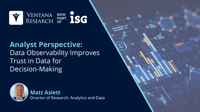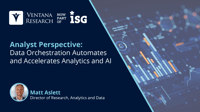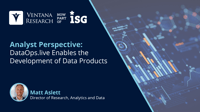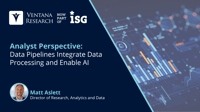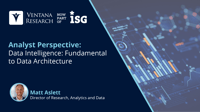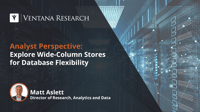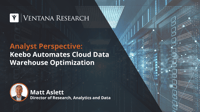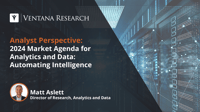I recently wrote about the role data observability plays in generating value from data by providing an environment for monitoring its quality and reliability. Data observability is a critical functional aspect of Data Operations, alongside the development, testing and deployment of data pipelines and data orchestration, as I explained in our Data Observability Buyers Guide. Maintaining data quality and trust is a perennial data management challenge, often preventing organizations from operating...
Read More
Topics:
data operations,
Analytics & Data,
Data Intelligence
Enterprises are embracing the potential for artificial intelligence (AI) to deliver improvements in productivity and efficiency. As they move from initial pilots and trial projects to deployment into production at scale, many are realizing the importance of agile and responsive data processes, as well as tools and platforms that facilitate data management, with the goal of improving trust in the data used to fuel analytics and AI. This has led to increased attention on the role of data...
Read More
Topics:
data operations,
AI & Machine Learning,
Analytics & Data
I recently wrote about the development, testing and deployment of data pipelines as a fundamental accelerator of data-driven strategies as well as the importance of data orchestration to accelerate analytics and artificial intelligence. As I explained in the recent Data Observability Buyers Guide, data observability software is also a critical aspect of data-driven decision-making. Data observability addresses one of the most significant impediments to generating value from data by providing an...
Read More
Topics:
Analytics,
Data Ops,
data operations,
AI & Machine Learning,
Analytics & Data,
Generative AI,
Machine Learning Operations
I recently wrote about the development, testing and deployment of data pipelines as a fundamental accelerator of data-driven strategies. As I explained in the 2023 Data Orchestration Buyers Guide, today’s analytics environments require agile data pipelines that can traverse multiple data-processing locations and evolve with business needs.
Read More
Topics:
Analytics,
data operations,
AI & Machine Learning,
data platforms,
Analytics & Data,
Generative AI,
Data Intelligence
I wrote recently about the role that data intelligence has in enabling enterprises to facilitate data democratization and the delivery of data as a product. Data intelligence provides a holistic view of how, when, and why data is produced and consumed across an enterprise, and by whom. This information can be used by data teams toensure business users and data analysts are provided with self-service access to data that is pertinent to their roles and requirements. Delivering data as a product...
Read More
Topics:
Analytics,
Data Ops,
data operations,
AI & Machine Learning,
data platforms,
Analytics & Data,
GenAI,
Data Intelligence
The development, testing and deployment of data pipelines is a fundamental accelerator of data-driven strategies, enabling enterprises to extract data from the operational applications and data platforms designed to run the business and load, integrate and transform it into the analytic data platforms and tools used to analyze the business. As I explained in our recent Data Pipelines Buyers Guide, data pipelines are essential to generating intelligence from data. Healthy data pipelines are...
Read More
Topics:
Analytics,
AI,
data operations,
AI & Machine Learning,
data platforms,
Analytics & Data,
Data Intelligence
As enterprises seek to increase data-driven decision-making, many are investing in strategic data democratization initiatives to provide business users and data analysts with self-service access to data across the enterprise. Such access has long been a goal of many enterprises, but few have achieved it. Only 15% of participants in Ventana Research’s Analytics and Data Benchmark Research say their organization is very comfortable allowing business users to work with data that has not been...
Read More
Topics:
Analytics,
data operations,
AI & Machine Learning,
Analytics & Data,
Data Intelligence,
Data Products,
Data Democratization
I have previously written about the functional evolution and emerging use cases for NoSQL databases, a category of non-relational databases that first emerged 15 or so years ago and are now well established as potential alternatives to relational databases. NoSQL is a term used to describe a variety of databases that fall into four primary functional categories: key-value stores, wide-column stores, document-oriented databases and graph databases. Each is worthy of further exploration, which is...
Read More
Topics:
Data,
data operations
In recent years, many enterprises have migrated data platform workloads from on-premises infrastructure to cloud environments, attracted by the promised benefits of greater agility and lower costs. The scale of cloud data platform adoption is illustrated by Ventana Research’s Data Lakes Dynamic Insights research: For two-thirds (66%) of participants, the primary data platform used for analytics is cloud based. As the quantity and importance of the data platform workloads deployed in the cloud...
Read More
Topics:
business intelligence,
Cloud Computing,
data operations,
AI & Machine Learning,
robotic automation,
Analytics & Data,
analytic data platforms
Ventana Research recently announced its 2024 Market Agenda for Analytics and Data, continuing the guidance we have offered for two decades to help enterprises derive optimal value and improve business outcomes.
Read More
Topics:
embedded analytics,
Business Intelligence,
Data Governance,
Data Management,
natural language processing,
data operations,
Process Mining,
Streaming Analytics,
AI & Machine Learning,
Analytics & Data,
Streaming Data & Events,
analytic data platforms,
Operational Data Platforms




